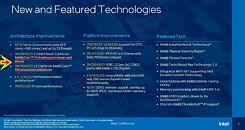- Joined
- Oct 9, 2007
- Messages
- 47,423 (7.51/day)
- Location
- Hyderabad, India
| System Name | RBMK-1000 |
|---|---|
| Processor | AMD Ryzen 7 5700G |
| Motherboard | ASUS ROG Strix B450-E Gaming |
| Cooling | DeepCool Gammax L240 V2 |
| Memory | 2x 8GB G.Skill Sniper X |
| Video Card(s) | Palit GeForce RTX 2080 SUPER GameRock |
| Storage | Western Digital Black NVMe 512GB |
| Display(s) | BenQ 1440p 60 Hz 27-inch |
| Case | Corsair Carbide 100R |
| Audio Device(s) | ASUS SupremeFX S1220A |
| Power Supply | Cooler Master MWE Gold 650W |
| Mouse | ASUS ROG Strix Impact |
| Keyboard | Gamdias Hermes E2 |
| Software | Windows 11 Pro |
Remember how 12th Gen Core i5 non-K was vastly different in performance from the Core i5 K/KF on account of being 6P+0E processors in comparison to more L3 cache and a 6P+4E core-count of the i5-12600K/KF? Intel is doubling down on creating architectural confusion in the mid-range, according to a 3DCenter.org article citing a leaked slide from Intel's 13th Gen Core launch press-deck.
We had earlier thought that the 13th Gen non-K Core i5 will have a 6P+4E core-config, but still be based on "Raptor Lake" (i.e. "Raptor Cove" P-cores + "Gracemont" E-cores), in comparison to the i5-13600K/KF, which are confirmed "Raptor Lake" chips with 6P+8E configuration; but it turns out that Intel is basing the non-K 13th Gen Core i5 on the older "Alder Lake" microarchitecture. These chips will be 6P+4E (that's six "Golden Cove" P-cores + four "Gracemont" E-cores), which make them essentially identical to the i5-12600K, but without the unlocked multiplier, and a lower 65 W processor base power.

Being based on the "Alder Lake" architecture has many implications for chips such as the i5-13400, i5-13500, and i5-13600 (non-K), the biggest of which will be lower IPC of the "Golden Cove" P-cores, which according to AMD's benchmarks, are already beaten by the "Zen 4." This means that the i5-13400 will have no chance squaring off against Ryzen 5 7000-series SKUs, given that the Ryzen 5 7600X already beats the current flagship i9-12900K in gaming performance, according to AMD.
The "Gracemont" E-core clusters on "Alder Lake" come with smaller 2 MB shared L2 caches, compared to 4 MB on "Raptor Lake," and so the performance of the E-cores will be lower, too. The i5-13400 and i5-13500 will have a tough time matching the multi-threaded performance of the 7600X despite the E-core muscle, owing to their lower clock-speeds on both the P-cores and E-cores.
This also casts doubt on whether there will even be a "13th Gen Core i3" series. There was no 11th Gen Core i3 "Rocket Lake," and Intel pushed the 10th Gen Core i3 "Comet Lake" through the market cycle of "Rocket Lake." as "Comet Lake" and "Rocket Lake" shared Socket LGA1200. It's likely that the Core i3 will continue being sold under the 12th Gen branding, as it's socket-compatible with both 600-series and 700-series chipset motherboards. These are still 4P+0E processors, and unless AMD comes up with 4-core/8-thread "Zen 4" parts, we don't see Intel tinker with the Core i3 series.
View at TechPowerUp Main Site | Source
We had earlier thought that the 13th Gen non-K Core i5 will have a 6P+4E core-config, but still be based on "Raptor Lake" (i.e. "Raptor Cove" P-cores + "Gracemont" E-cores), in comparison to the i5-13600K/KF, which are confirmed "Raptor Lake" chips with 6P+8E configuration; but it turns out that Intel is basing the non-K 13th Gen Core i5 on the older "Alder Lake" microarchitecture. These chips will be 6P+4E (that's six "Golden Cove" P-cores + four "Gracemont" E-cores), which make them essentially identical to the i5-12600K, but without the unlocked multiplier, and a lower 65 W processor base power.

Being based on the "Alder Lake" architecture has many implications for chips such as the i5-13400, i5-13500, and i5-13600 (non-K), the biggest of which will be lower IPC of the "Golden Cove" P-cores, which according to AMD's benchmarks, are already beaten by the "Zen 4." This means that the i5-13400 will have no chance squaring off against Ryzen 5 7000-series SKUs, given that the Ryzen 5 7600X already beats the current flagship i9-12900K in gaming performance, according to AMD.
The "Gracemont" E-core clusters on "Alder Lake" come with smaller 2 MB shared L2 caches, compared to 4 MB on "Raptor Lake," and so the performance of the E-cores will be lower, too. The i5-13400 and i5-13500 will have a tough time matching the multi-threaded performance of the 7600X despite the E-core muscle, owing to their lower clock-speeds on both the P-cores and E-cores.
This also casts doubt on whether there will even be a "13th Gen Core i3" series. There was no 11th Gen Core i3 "Rocket Lake," and Intel pushed the 10th Gen Core i3 "Comet Lake" through the market cycle of "Rocket Lake." as "Comet Lake" and "Rocket Lake" shared Socket LGA1200. It's likely that the Core i3 will continue being sold under the 12th Gen branding, as it's socket-compatible with both 600-series and 700-series chipset motherboards. These are still 4P+0E processors, and unless AMD comes up with 4-core/8-thread "Zen 4" parts, we don't see Intel tinker with the Core i3 series.
View at TechPowerUp Main Site | Source






